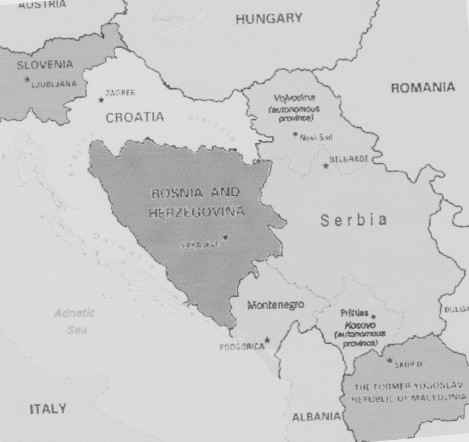 |
|
|
|
|
| Map of former Yugoslavia now divided into several independent states and autonomous areas |
Yugoslavia was ideally suited for the Brichah since it provided many routes for transporting Jews out of Eastern Europe. At first it was hoped that the routes would lead to Greece and onward to Palestine. But Britain had great influence in Greece and made sure that Greek ports were closed to Brichah agents. Since the Brichah was prevented from moving south it turned west to Italy or north to Austria.
Yugoslavia had a Jewish population of about 80,000 Jews prior to the war. Just 14,000 Yugoslav Jews survived the war. About 4,572 recorded Yugoslav Jews fought with the partisans and some reached high positions within the ranks of the partisan army of Marshal Tito, leader of the Yugoslav Communist party and military commander of all partisan forces in the country. He welcomed the Palestinian parachutists and aided their efforts.
|
|
| Josip Broz Tito |
|
|
| Yugoslav partisans with Jewish parachutists from Palestine 1944 |
Following the war, the surviving Yugoslav Jews returned home and started to rebuild their lives. Jewish communities began to function again including Zionist youth groups who would become instrumental in Brichah efforts.
Meanwhile thousands of Jewish refugees were stuck in Romania since Romanian ports were closed to the Brichah. Kovner discussed the problem with his assistants and they decided to launch exploratory missions to neighboring countries. As mentioned earlier, one of the roads led to Budapest in Hungary. In April of 1945 Kovner sent a group of partisans headed by Mula Ben Haim to Yugoslavia[1]. They arrived in Belgrade and immediately began to make contacts with local organizations. A smaller group led by Pinhas Zeitag reached Split in May and met up with soldiers
|
|
| Mula Ben Haim, head of Yugoslav Brichah |
of the Jewish Brigade stationed in Treviso, Italy, next to the Yugoslav border. The linking of European Jewry with the Palestinians was vital to the Brichah efforts. The Yugoslav Brichah had established a new route for the Jewish refugees stuck in Romania. Papers were forged to the effect that the carriers of these identity papers were repatriated to their homeland. The route began in Arad or Timisoara, Romania headed to Belgrade, or Zagreb, Yugoslavia and then to Trieste, Italy[2]. Even the British embassy accepted the documents as authentic and allowed entry to Palestine for 100 Jewish refugees. Yugoslav authorities soon realized the repatriation papers were not legitimate but decided to ignore them.
The Brichah now had two routes that enabled them to transport the Jews refugees from Romania. The Hungarian route was the best organized since it relied on the Hungarian Zionist youth groups who had great success moving Jews towards Italy and Austria. But many Jews, particularly those coming from Russia, preferred the Yugoslav road since it offered safety from Soviet control.
The Yugoslav route was used extensively by Jewish Brigade representatives who came from Italy to Bucharest, Romania to discuss ways of improving the movements of Jewish refugees to Italy. Slowly the number of Jewish refugees climbed to 70,000[3]. The survivors were quartered in Italian DP camps supported and maintained by the JDC.
|
|
| Mula Ben Haim's fake papers in Yugoslavia |
Ben Haim established excellent contacts with the Jewish community in Belgrade who introduced him to high ranking officials in the government. The Brichah office even received a partial official standing regarding matters of emigration to Palestine. The Yugoslav route was used extensively by the Brichah and Kovner himself used it to reach Italy. Very few Jewish refugees remained in Yugoslavia, most of them continued their journey to Palestine while some managed to reach other countries. Yugoslavia was yet another country that actively helped the mass exodus of Jews from Eastern Europe to Central Europe. The British government pressured these governments and countries to stop the flow of Jews. Britain knew that most of the Shoah survivors were trying to get to Palestine. But Britain was losing power and the Jews who had survived Hitler and Stalin were now fighting hard for their future. Many countries preferred to let them go and the Jews left en masse facing an unknown destiny.
| Name | First name | Code name | Gender |
| BABETLERDER | Itzhak | Jacek | M |
| BEN–HAIM | Rivkah | F | |
| BEN–YAIRI | Yaacov | M | |
| DAN | Shaike | M | |
| DAN | Eva | F | |
| GOLDSTEIN | Benyamin | M | |
| HERSHKOWITZ | Zvi | M | |
| MULA | Ben Haim | M | |
| WEISS | Masha | F | |
| WERNIK | Natke | M | |
| WIERNIK | Itzhak | M | |
| ZEITAG | Pinhas | M | |
| ZILBER | David | M |
Footnotes
|
|
JewishGen, Inc. makes no representations regarding the accuracy of
the translation. The reader may wish to refer to the original material
for verification.
JewishGen is not responsible for inaccuracies or omissions in the original work and cannot rewrite or edit the text to correct inaccuracies and/or omissions.
Our mission is to produce a translation of the original work and we cannot verify the accuracy of statements or alter facts cited.
 Brichah
Brichah
 Yizkor Book Project
Yizkor Book Project
 JewishGen Home Page
JewishGen Home Page
Copyright © 1999-2026 by JewishGen, Inc.
Updated 24 Mar 2017 by JH